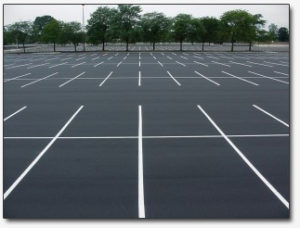
It is LEGAL to have a firearm in a vehicle in any parking lot, EXCEPT as prohibited under state and federal law, if:
- The person is not a prohibited person
- The effect is a substantial burden on that individual’s free exercise of religion
When an individual leaves (stores) a firearm in a vehicle, the firearm must be locked in the vehicle or in a locked container attached to the vehicle AND the firearm cannot be seen from the outside of the vehicle.
Restrictions Allowed
It is ILLEGAL to have a firearm in a vehicle if:
- The property owner provides FREE alternative parking where you can store firearms in your vehicle;
- The property owner provides a secured and monitored storage location where you can securely store a firearm before proceeding with the vehicle into the secured parking area;
- The person signs a lease agreement that prohibits firearms on the property;
- The person complies with Subsection 34-45-107(5);
It is ILLEGAL to carry or have a firearm in your vehicle on the following properties which include parking lots
- Correctional Facilities
- Mental Health Facilities
- Military Installations*
- Post Offices**
* You may be able to take firearms onto the military installation for a shooting club ONLY if you have written authorization from the base commander.
Utah National Guard service members are exempt and CAN have a firearm in their vehicle on installations owned by the state (Camp Williams)
Private Property Owners Are Protected From Liability
- If the property owner complies with the law and allows firearms to be stored in vehicles in their parking lot, they are not liable in any civil action for any occurrence resulting from, connected with, or incidental to the use of a firearm, by any person, unless the use of the firearm involves a criminal act by the person who owns or controls the parking area.
- A property occupant, who knowingly allows a firearm possessor to lawfully bring a firearm onto the occupant’s property, is not civilly or criminally liable for any damage or harm resulting from the discharge of the firearm by the firearm possessor while on the occupant’s property unless the property occupant solicits, requests, commands, encourages, or intentionally aids the firearm possessor in discharging the firearm while on the occupant’s property for a purpose other than the lawful defense of an individual on the property.
Private Property Owners Failure To Comply
If the property owner does not comply with the law, they can be sued.
People who have to sue the property owner can recover civil damages and even punitive damages to punish the parking lot owner, but the person suing has to show the Utah Attorney General warned the parking lot owner that they were in violation of the law or their failure to comply resulted in serious injury or death
The Attorney General can sue as well as the private attorney of the injured person or whose rights were violated.
Laws
- 34-45-101. Title.
- 34-45-102. Definitions.
- 34-45-103. Protection of certain activities — Firearms — Free exercise of religion
- 34-45-104. Protection from liability.
- 34-45-105. Cause of action for noncompliance — Remedies.
- 34-45-106. Enforcement by attorney general.
- 34-45-107. Exemptions — Limitations on chapter — School premises — Government entities — Religious organizations — Single family detached residential units.
- 53-5a-103. Discharge of firearm on private property — Liability.
Prohibited Property & Parking Lots
Correctional & Mental Health Facilities
76-8-311.3. Items prohibited in correctional and mental health facilities — Penalties.
(1)(a) As used in this section:
(iii) “Correctional facility” means:
(A) a facility operated by or contracting with the Department of Corrections to house an offender in either a secure or nonsecure setting;
(B) a facility operated by a municipality or a county to house or detain an offender;
(C) a juvenile detention facility; or
(D) a building or grounds appurtenant to a facility or land granted to the state, municipality, or county for use as a correctional facility.
(iv) “Dangerous weapon” means the same as that term is defined in Section 76-11-101.
…
(vi) “Firearm” means the same as that term is defined in Section 76-11-101.
…
(viii) “Mental health facility” means the same as that term is defined in Section 26B-5-301.
(b) Terms defined in Sections 76-1-101.5 and 76-8-101 apply to this section.
(2) (a) Notwithstanding Section 53-5a-102, a correctional facility or mental health facility may prohibit a firearm, ammunition, a dangerous weapon, an implement of escape, an explosive, a controlled substance, spirituous or fermented liquor, medicine, or poison from being:
(i) transported to or within a correctional facility or mental health facility;
(ii) sold or given away to an offender at a correctional facility or mental health facility; or
(iii) possessed by an offender or another individual at a correctional facility or mental health facility.
…
(4) (a) Except as provided by Subsection (4)(b) or (4)(c), an actor may be charged under Section 76-8-311.4, 76-8-311.6, 76-8-311.7, 76-8-311.8, 76-8-311.9, 76-8-311.10, or 76-8-311.11 for a violation of a policy or rule created under this section.
(b) An actor who knowingly or intentionally transports, possesses, distributes, or sells an explosive in a correctional facility or a mental health facility may be punished under Section 76-15-210 or 76-15-211.
…
(5) Exemptions to a policy or rule created under this section may be granted for worship of Native American inmates in accordance with Section 64-13-40.
26B-5-301. Definitions.
As used in this part, Part 4, Commitment of Persons Under Age 18, and Part 5, Essential Treatment and Intervention:
…
(17) “Mental health facility” means the Utah State Hospital or other facility that provides mental health services under contract with the division, a local mental health authority, a person that contracts with a local mental health authority, or a person that provides acute inpatient psychiatric services to a patient.
…
(24) “State hospital” means the Utah State Hospital established in Section 26B-5-302.
